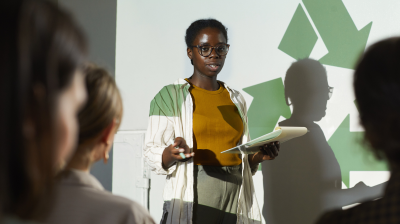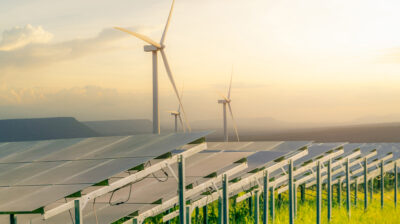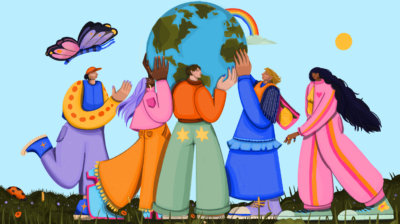How to take climate action in your local community
If you want to do more to help the environment, you can start close to home by looking for opportunities in your local area

The climate crisis impacts all of us, regardless of age, gender, profession or nationality. However, while the climate crisis is an issue that affects everyone, it is also important to know that many climate solutions have incredible co-benefits and everyone can affect positive change. Taking climate action in your local community is one way of doing this.
How to take climate action in your local community
There are many ways to be a climate activist. While some climate organisations and protests are in larger cities, it isn’t necessary to leave your community to make a difference. In fact, focusing on your local community means you can avoid travelling (which helps to keep down your carbon footprint), build stronger connections in your local area, and meet new people with similar interests to you.
Consider how much time you can commit
Even if climate and environmental action is one of your main interests, it is important to balance your involvement with other needs such as rest and social time.
Setting up a group or organisation yourself takes a lot of time and energy. If this is something you are considering doing, it is a good idea to speak with someone in a similar position to get a realistic sense of what is involved. If you are interested in joining an existing group, ask what their expectations are before making a commitment. Be honest with yourself and others about how much time you can promise. No matter how much time you can give, know that it is enough.
Look for existing groups
Getting involved in an existing group might help you to gain connections and find inspiration. There are many local groups that organise events like litter clean ups on the streets, in parks or on beaches. Getting involved with a shared vegetable allotment or community garden could allow you to learn some new skills, grow your own food and reduce your carbon footprint. There might be a local nature group where you can learn more about local ecosystems and species and how to protect them, or maybe you’d like to be part of an effort to bring more cycling lanes to your area. The types of activities you can get involved in will depend on where you live and the issues you’re facing.
If you can’t find any groups in your area, consider starting your own – finding a few others who are willing to commit the time can be important to make sure you don’t get overwhelmed.
Get involved in citizen science projects
You don’t need a university degree to take part in important environmental research. There are lots of easy ways you can get involved in scientific research with little effort required. There are many projects monitoring wildlife, habitats, water quality or pollution levels that need involvement from members of the public. These are known as citizen science projects. It can be as simple as reporting sightings of certain animals in your area, or placing a small box in your garden to monitor the air quality in your area. This data can then be used as part of the research.
Find out about different citizen science projects taking place in Ireland on the EPA website.
Buy local produce or grow it yourself
If it is possible for you to do so, buying local produce is one way you can take climate action. A lot of the produce that we find in supermarkets is grown in other places. To get to our shelves, it needs to be transported by truck or plane and these forms of transport contribute to greenhouse gas emissions. By buying seasonal food that is grown close to home, you can help to reduce these emissions.
By looking online, on community notice boards and asking other people, you might find somebody who is selling produce. Farmers markets are another good place to find locally-grown fruit and vegetables.
You could also consider growing things yourself. It’s possible to grow fresh vegetables and herbs both indoors and outdoors, even on a small windowsill or balcony.
Talk to your local councillors
It is important to remember that you are not personally responsible for solving the climate crisis. Decisions made by governments, industry leaders and big business have led us to the situation we are currently in. If we want to limit global warming, we need significant and meaningful changes to be made by governments and companies worldwide.
A lot of positive changes that could be made to address the climate crisis can happen at a local level, such as building safe cycle lanes, planting more trees and letting grass and wildflowers grow. If you are worried about climate change, you can speak with your local councillors and urge them to take action on this issue. Find out who your local councillors are by visiting your local authority website.
Challenge local or national policies or laws
One way to demand action from the government or local authorities is to challenge them to change their policies or reform laws by accessing free legal advice and even taking legal action against them. There are a number of cases around the world where young people have taken their governments to court over their lack of action on the climate crisis. In 2020, a group called Climate Case Ireland took the Irish government to the Supreme Court for their failure to take adequate action on climate change, and they won their case.
However, your action doesn’t have to be as big as that – you can also look at environmental issues affecting your local area like air pollution, flooding or water quality, and take these issues up with your local authorities.
You can access free legal advice through the Centre for Environmental Justice, who hold free clinics every month. They can also provide training and information for community groups, and work to reform policies and laws.
Become a Climate Ambassador
If you need a bit more support and training about climate action, you can apply to become a Climate Ambassador. Find out more about the An Taisce Climate Ambassador programme.






